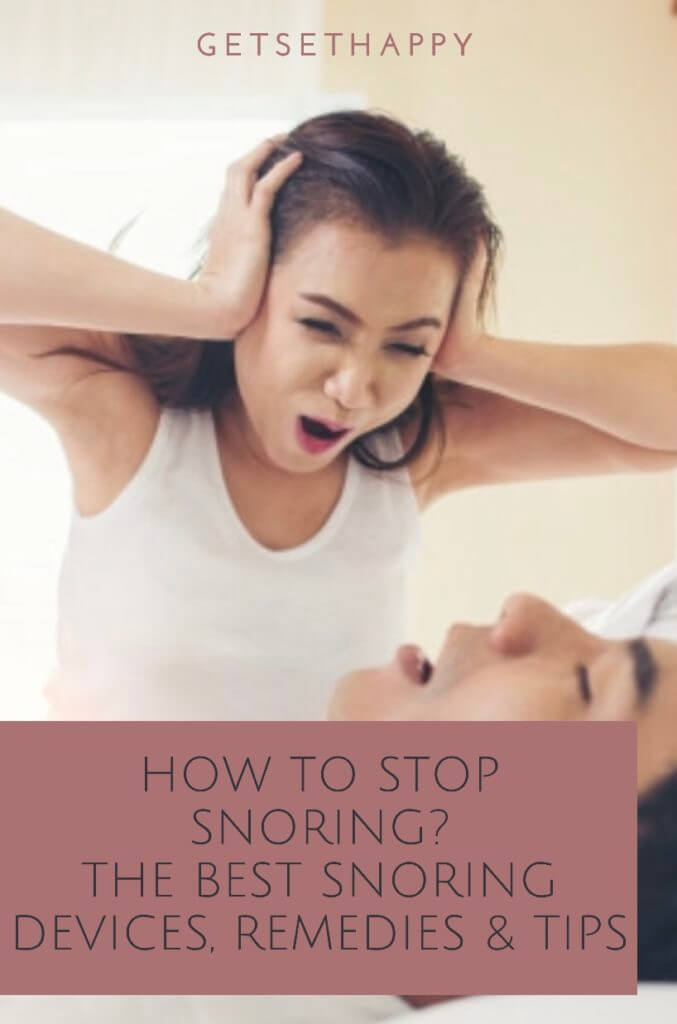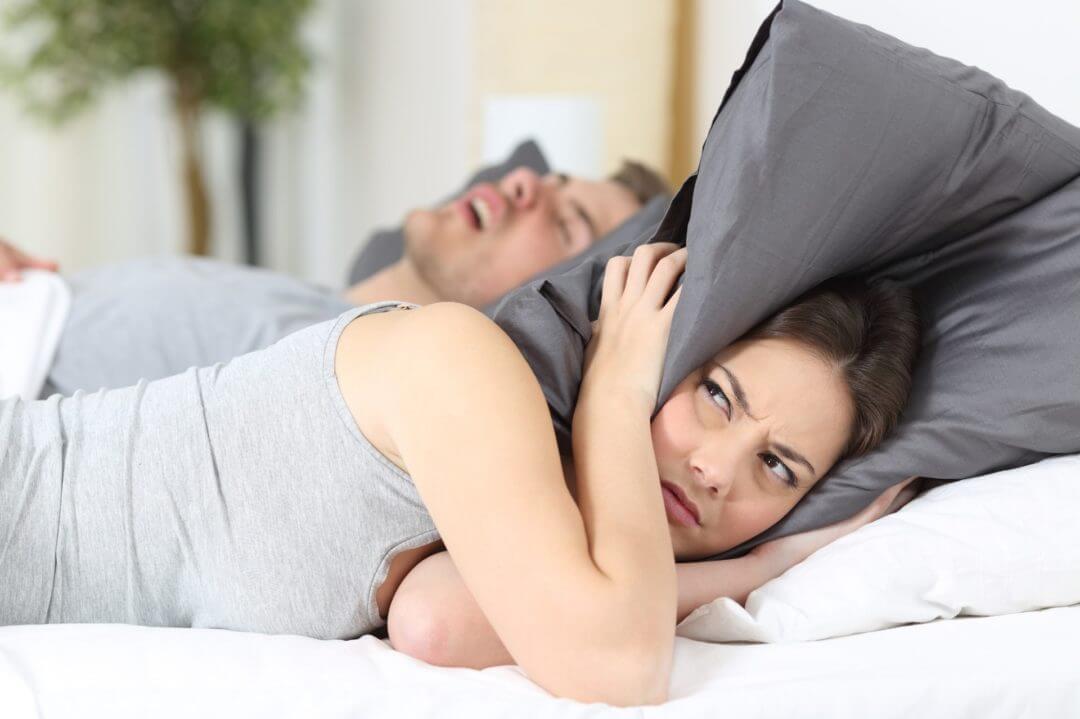Are you tired of being tired? If snoring is interrupting your sleep each night, you’re not alone—the Sleep Foundation estimates that snoring impacts 57% of men and 40% of women, almost half the population.
There are many factors that lead to snoring, including age, weight, diet, and pre-existing health conditions. However, snoring can be a huge nuisance for both yourself and for the people you live with, so you may be curious to learn how to stop snoring.
Luckily, there are plenty of snoring devices and tips that can help you sleep better each night. To learn more, keep reading to find our top tips to get rid of snoring for good—they’re easier than you think!
1. Upgrade Your Pillows
If you’re looking for a simple way to stop snoring, start with your pillows. There are plenty of specialist pillows, designed to relieve snoring, and you may find one useful.
People who sleep on their side tend to snore less often than those who sleep on their backs, so look for a pillow that is curved to support sleeping on your side. It will have an indentation for your neck and provide you with head and spine support while on your side.
You may find, at first, that it feels weird to sleep on your side. However, over time, you’ll get used to it, and it can help reduce or eliminate your snoring.
You can also look for a product called a realignment pillow, which is designed to prevent airway compression when you’re asleep, which causes snoring.
Any specialist bedding or furniture store can provide recommendations for these pillows, or ask your doctor for suggestions.
2. Try Getting Help from Snoring Devices Like a Mouthpiece
For some snoring sufferers, you may find relief from a mouthpiece. If you’re ever played sports and worn a mouth guard, or worn a retainer, then you may be familiar with the shape of the mouthpiece.
These are devices that fit over your teeth and work to gently move your jaw forward, which tightens your airways and prevents snoring. If you’re snoring due to age, weight, or from sleeping on your back, then you may find mouthpieces useful.
The best results come from mouthpieces that are professionally fitted by your dentist. If visiting a dentist is out of your budget, you can also purchase generic mouthpieces online—just make sure to find one that’s adjustable, so you can ensure it fits your mouth.
Another common type of mouthpiece is known as a tongue retainer. This snoring device fits onto the end of your tongue, preventing it from causing snoring by blocking your airway.
Some people may be put off by the look or feel of mouthpieces, but it’s worth giving them a shot, as you’ll get used to them over time.
3. Add a Humidifier to the Bedroom
Do you have a humidifier in your bedroom? If not, this could be one of the main reasons why you’re snoring.
Humidifiers are machines that add moisture to dry air, something very common in homes—especially in the summer months when we have the air on. Dry air leads to a dry mouth, which can make snoring worse.
Try adding a cool mist humidifier to your bedroom, as it can be a soothing way to ease your snoring. It will also soothe dry skin, help remove germs from the air, and help you breathe easier through the night.
If you suffer from allergies or live in an area that frequently experiences pollution, then you may also want to consider an air purifier. These filter out irritants from the air we breathe, making it cleaner and healthier.
Anyone who experiences allergies and related-snoring problems from living with a smoker, a pet, or from hay fever, try out an air purifier.
4. Rule Out More Serious Causes
Snoring may be an annoyance, but for some people, it can be a serious health concern.
If you’ve been struggling with snoring for some time, or if you’re snoring seems to be getting worse, then we recommend you talk to your doctor as a precaution.
For some patients, severe snoring is a symptom of a condition called sleep apnea, which can be potentially deadly if not treated. Sleep apnea is a disorder where you stop breathing while asleep, temporarily.
Symptoms of sleep apnea include nights where you temporarily stop breathing in your sleep, loud snoring, daytime fatigue, headaches, and struggling to breathe in the night. Untreated sleep apnea can increase your risk of heart problems, stroke, and even diabetes, so don’t hesitate to get checked out if you think you may have this disorder.
Your doctor can perform a series of tests that can diagnose you, and there are plenty of effective treatment options that will help you live a more normal life.
5. Change Your Diet
Sometimes, changes to your diet can help with snoring problems. Certain foods, such as dairy, can inflame our throat and make it hard to sleep.
Your doctor can advise on which foods may help relieve your snoring, but both gluten and dairy are common culprits.
In addition, you may want to cut back on alcohol and drink more water throughout the day. Drinking alcohol relaxes the muscles in your throat, which leads to an increase in snoring.
Instead of an evening cocktail before bed, try increasing your water intake. When we are dehydrated, we tend to snore more, as it creates excess mucus in our nose.
It goes without saying, but give up the cigarettes as well—they’re adding to the snoring problem by inflaming your airways, not to mention all the other health problems they cause.
Overall, a healthy diet that’s combined with daily exercise will help you sleep better and will help with your snoring. If you’re unsure how to get started, it can help to work with a nutritionist to develop weekly diet plans.
6. Nasal Dilators
Another snoring device that might help is something called a nasal dilator. The most popular type is an external strip that goes over the bridge of your nose, helping to open up your nasal passages.
They’re not medicated, so there are no side effects, plus they are inexpensive and comfortable to wear while you’re in bed. If you want to try them out, you can find them at most pharmacies.
You can also find internal nasal dilators, which work by widening your nostrils.
7. Get Enough Sleep Each Night
If you’re tossing and turning each night, from stress or insomnia, you may have noticed that it’s making your snoring worse.
When we are exhausted, we tend to snore more. While it’s not always possible to reduce insomnia, it can help to have strategies for managing your stress, keeping your phone and TVs out of the bedroom, and having consistent bed and wake-up times.
Avoiding alcohol before bed can also improve the quality of your sleep.
Further Reading: Why Sleep Is So Important to Your Health?
8. Neti Pots Can Help
Have you heard of a neti pot? If not, this nifty device could help you out.
Neti pots are shaped similar to a small teapot and are used to clear your nose. Gently pour salt water into your nostrils and it’s an easy way to remove debris from your nose, such as allergens.
You can also find more modern versions, in the shape of a squeeze bottle, but both work in the same way. Using non-iodized salt, you make a mixture of water and salt that works to cleanse—it can be messy at first, but it’s effective!
They are helpful for people with allergies, sinus issues, and they can also be helpful when you’re congested from the cold or flu. They are an affordable treatment option and a good choice for anyone looking for a natural remedy for their snoring.
Stop Snoring with These Top Tips
Are you ready to stop snoring—for good? If so, try out some of the snoring devices, tips, and tricks mentioned above.
Although snoring is troublesome, it doesn’t need to ruin your life or keep your partner up all night. Instead, test out some of the remedies mentioned here until you find one that works for you.
Sometimes, seeking advice from your doctor or pharmacist can help as well, so don’t be afraid to reach out. Before you know it, you’ll be saying goodbye to snoring and enjoying the satisfaction of waking up well-rested and refreshed each morning.
Get started today and improve your sleeping for good.
Did you find this article useful? If so, please check out some of our other content to learn more.






No Comments